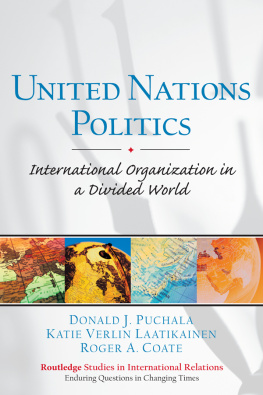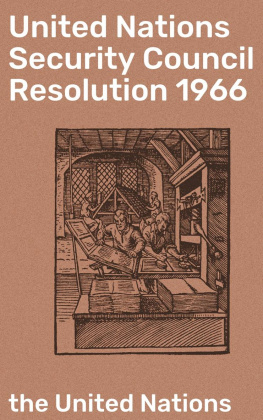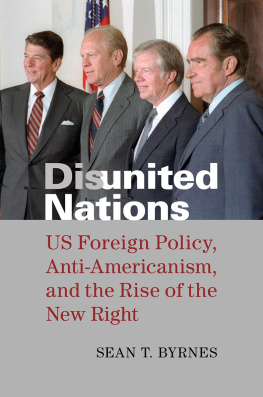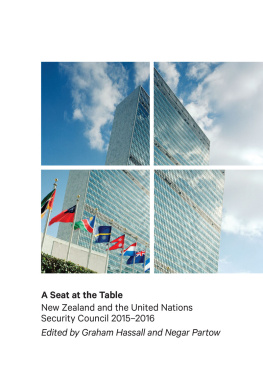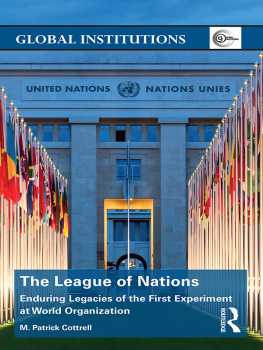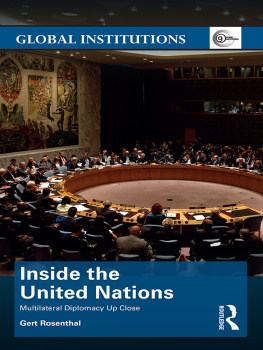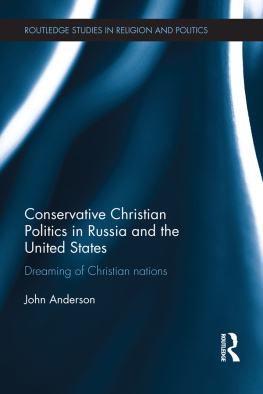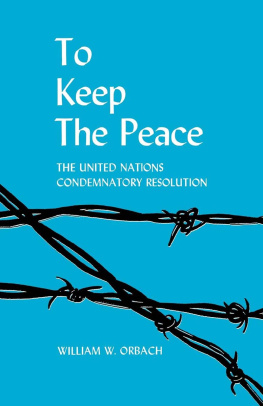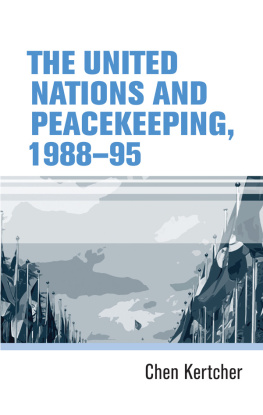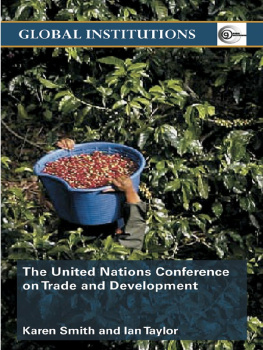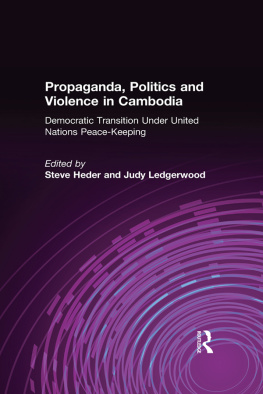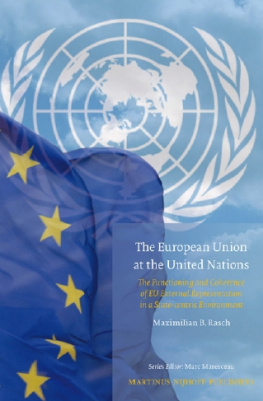ROUTLEDGE STUDIES IN INTERNATIONAL RELATIONS
ENDURING QUESTIONS IN CHANGING TIMES
Charles W. Kegley, Jr., Series Editor
In the era of globalization in the twenty-first century, people cannot afford to ignore the impact of international relations on their future. From the value of ones investments to the quality of the air one breathes, international relations matter. The instantaneous spread of communications throughout the world is making for the internationalization of all phenomena, while the distinction between the domestic and the foreign, the public and the private, and the national and the international is vanishing. Globalization is an accelerating trend that is transforming how virtually every field of study in the social sciences is being investigated and taught.
Contemporary scholarship has made bold advances in understanding the many facets of international relations. It has also laid a firm foundation for interpreting the major forces and factors that are shaping the global future.
To introduce the latest research findings and theoretical commentary, a new publication series has been launched. Routledge Studies in International Relations: Enduring Questions in Changing Times presents books that focus on the issues, controversies, and trends that are defining the central topics dominating discussion about international relations.
Series Editor
Charles W. Kegley, Jr.
Syracuse University
Series Editorial Advisory Board
Shannon Lindsey Blanton
University of Memphis
Linda P. Brady
Provost University of Oregon
Leann Brown
University of Florida
Steve Chan
University of Colorado, Boulder
William A. Clark
Louisiana State University
Charles F. Hermann
Texas A & M University
Margaret G. Hermann
Syracuse University
Ole R Holsti
Duke University
Steve W. Hook
Kent State University
Loch K. Johnson
University of Georgia
Christopher C. Joyner
Georgetown University
Jack S. Levy
Rutgers University
Craig Murphy
Wellesley College
Nicholas G. Onuf
Florida International University
Gregory A. Raymond
Boise State University
Neil R Richardson
University of Wisconsin
Volker Rittberger
Eberhard-Karls-Universitat Tubingen
J. Martin Rochester
University of Missouri, St. Louis
Joel Rosenthal
Carnegie Council on Ethics and International Affairs
Alpo Rusi
Helsinki University
Peter Schraeder
Loyola University, Chicago
Bengt Sundelius
Uppsala University
John Vasquez
University of Illinois
Thomas Volgy
University of Arizona
United Nations Politics
International Organization in a Divided World
Donald J. Puchala
University of South Carolina
Katie Verlin Laatikainen
University of South Carolina
Roger A. Coate
University of South Carolina
To the peoples of the world who truly need an effective United Nations in the twenty-first century and especially those involved with the UNfrom diplomats to aid workers, from those in the field to those at headquarterswho work tirelessly to make it so.
First published 2007 by Pearson Education, Inc.
Published 2016 by Routledge
2 Park Square, Milton Park, Abingdon, Oxon OX14 4RN
711 Third Avenue, New York, NY 10017, USA
Routledge is an imprint of the Taylor & Francis Group, an informa business
Copyright 2007 Taylor & Francis. All rights reserved.
All rights reserved. No part of this book may be reprinted or reproduced or utilised in any form or by any electronic, mechanical, or other means, now known or hereafter invented, including photocopying and recording, or in any information storage or retrieval system, without permission in writing from the publishers.
Notice:
Product or corporate names may be trademarks or registered trademarks, and are used only for identification and explanation without intent to infringe.
Credits and acknowledgments borrowed from other sources and reproduced, with permission, in this textbook appear on appropriate page within text.
ISBN: 9780131727656 (pbk)
Cover Design: Bruce Konselaar
Library of Congress Cataloging-in-Publication Data
Puchala, Donald James,
United Nations politics : international organization in a divided world / Donald J.
Puchala, Katie Verlin Laatikainen, Roger A. Coate.
p. cm.
Includes bibliographical references and index.
ISBN-13: 978-0-13-172765-6 (alk. paper)
ISBN-10: 0-13-172765-6 (alk. paper)
1. United Nations. I. Laatikainen, Katie Verlin, II. Coate, Roger A. III. Title.
JZ4984.5.P83 2007
341.23dc22
2006023791
Contents
CHAPTER 1
The United Nations at the Turn of the Twenty-First Century
CHAPTER 2
The Evolution of an Institutional Form
CHAPTER3
The UN Charter and Beyond
CHAPTER 4
The United Nations: The Last Bastion of Sovereignty?
CHAPTER 5
In Search of Leadership
CHAPTER 6
The Politics of Culture
CHAPTER 7
Peacekeeping: Paper, Preparation, and Politics
CHAPTER 8
Development and Its Discontents
CHAPTER 9
Reconsidering the United Nations
APPENDIX A
The United Nations System
APPENDIX B
Charter of the United Nations
Despite the evolution and institutionalization of complex processes of global governanceincluding the increased importance of non-state actors and international bureaucraciesmany of the challenges to multilateralism today stem from the tension between these broader developments and the political proclivities of national governments to defend sovereign prerogatives. This volume assesses the political challenges facing the United Nations and evaluates the capacities of the organization to face them. Our conclusions, contrary to much of the writing on global governance, emphasize political realism because the politics of competing national interests continue to define this world organization that is after all mainly a club of sovereign states.
The book adopts a political perspective for understanding the challenges that the UN multilateral system faces in responding to a variety of global problems in the 21st century. The fundamental elements of UN politics include Western hegemony and resistance to it, a lack of member governments commitments to cooperate within the UN despite the organizations considerable capacity for action, persisting sensitivies about protecting sovereignty, and obstacles to finding consensus and exercising leadership in a world deeply divided by relative wealth, unequal power, contending ideologies and poorly communicating cultures. We explore the nature of UN politics in debates over issues of universal values and human rights, peacekeeping, and development and human security. The concluding chapter assesses the capacity of the UN system to respond to 21st century challenges. Our conclusion, perhaps not entirely welcome, is that the United Nations is unlikely to respond very well to foreseeable challenges because the political environment within and without the organization will probably remain inhospitable to enhanced global governance. We end our long essay on UN politics with a practical reconsideration of the UN that acknowledges the fundamental political nature of the United Nations while identifying the prospects for transformation that are absent from current discussions of UN reform.

